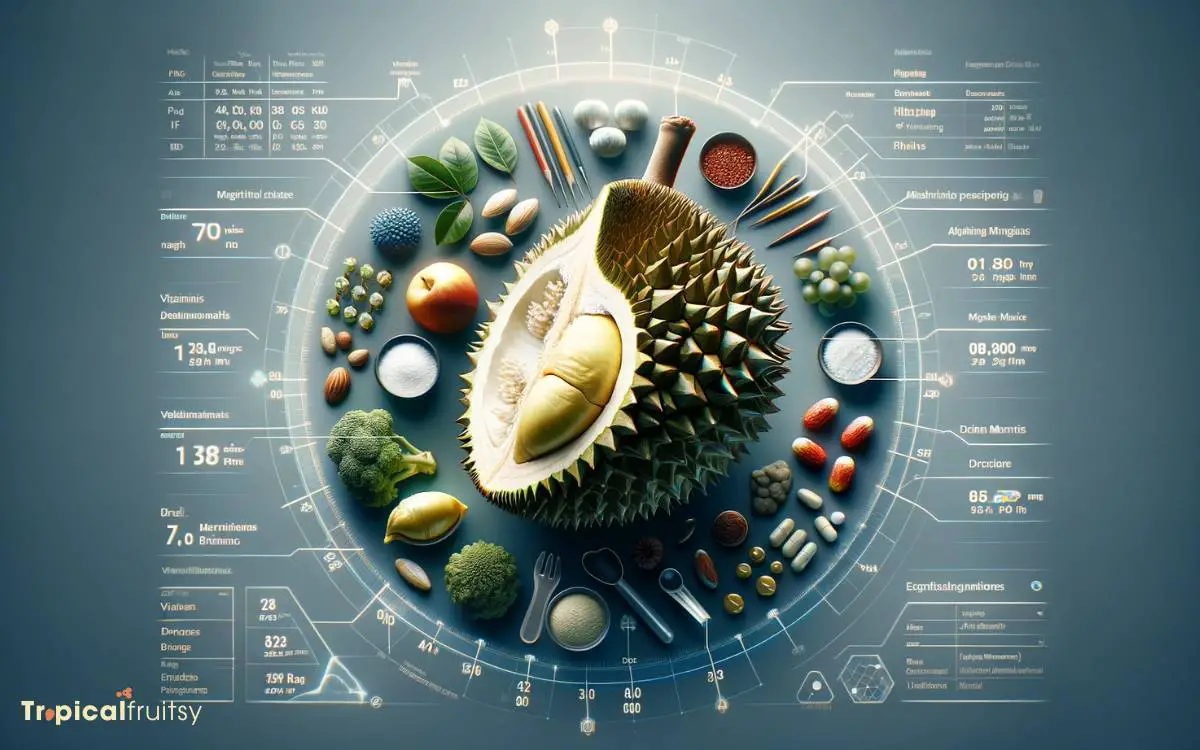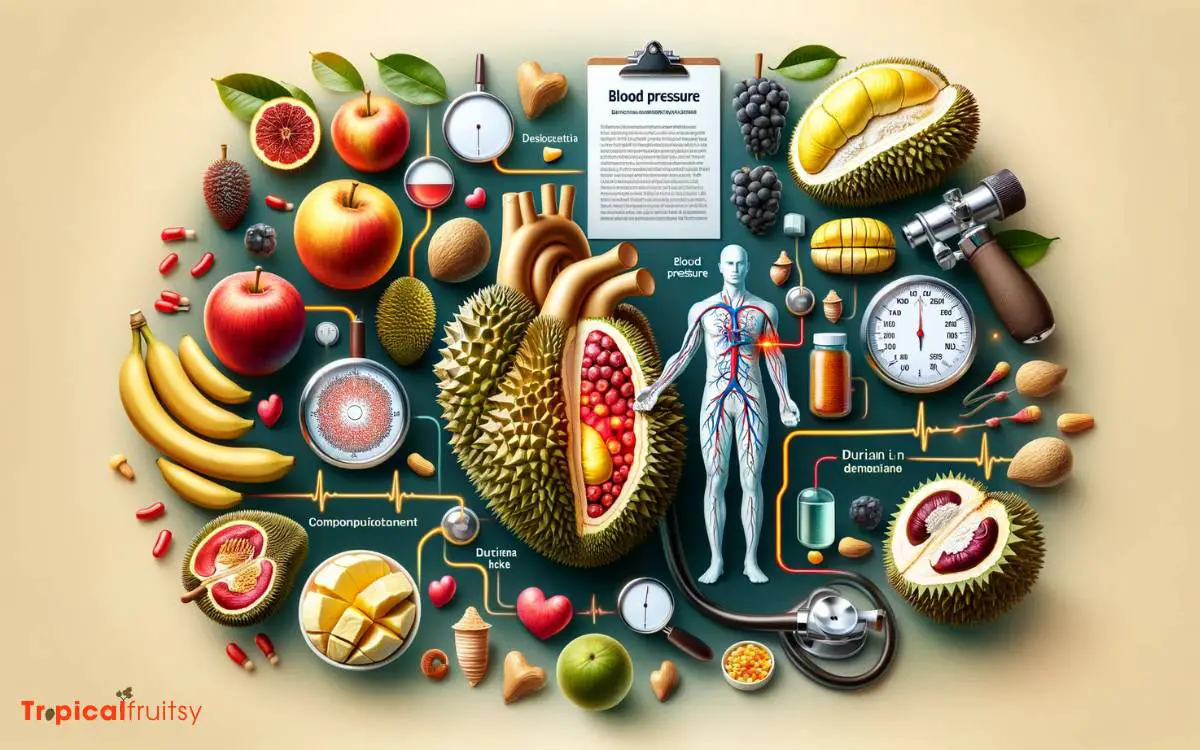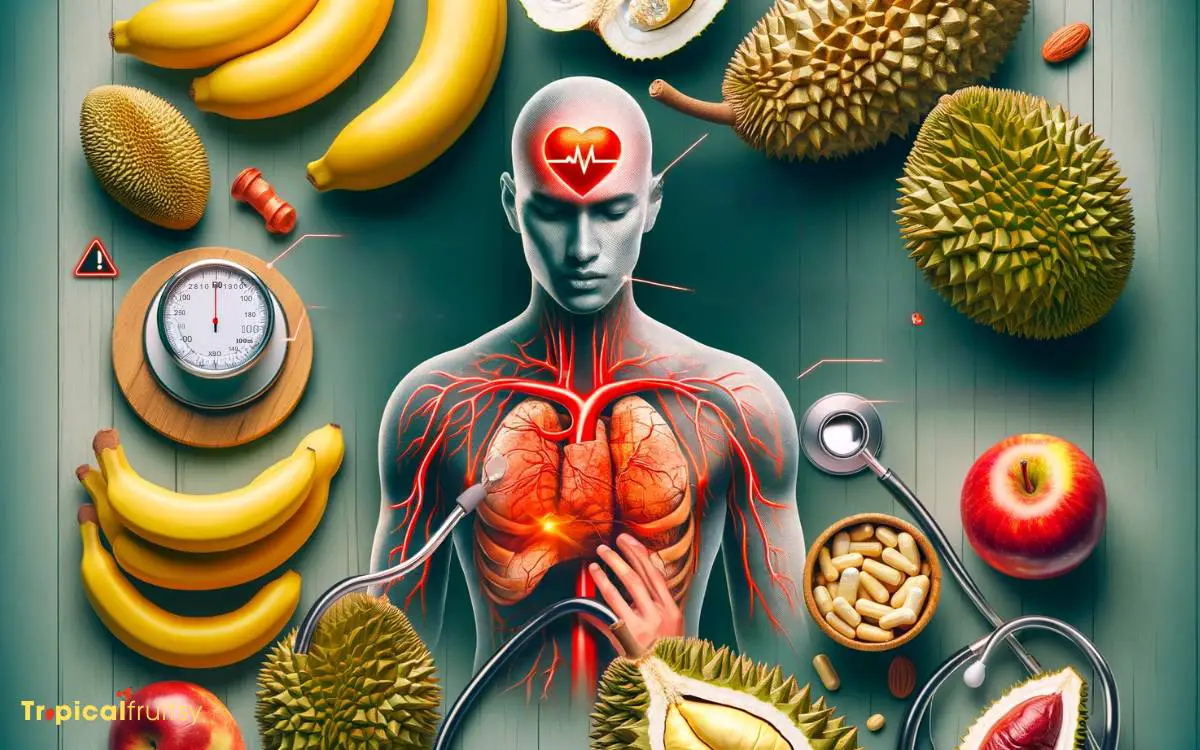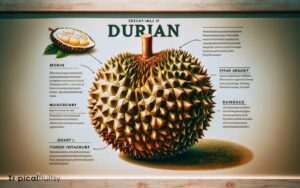Is Durian Bad for High Blood Pressure? Unraveling the Link!
Durian may not be the best choice for individuals with high blood pressure due to its high calorie and fat content. It’s important to consume it in moderation and be mindful of its potential impact on health.
Durian is a nutrient-dense fruit that contains vitamins and minerals, such as potassium, which can be beneficial for controlling blood pressure.
However, durian is also rich in calories and saturated fats, which may lead to weight gain and increased blood pressure if consumed in excess.
The following points should be considered:
For those with hypertension, enjoying durian in moderation is crucial to balance its nutritional benefits against potential health risks.

Key Takeaway
Nutritional Impact of Durian on Blood Pressure – An Analysis
| Nutrient | Amount per Serving (100g) | Potential Impact on Blood Pressure |
|---|---|---|
| Calories | 147 kcal | May increase if leads to weight gain |
| Fat | 5g (of which 2g is saturated) | Can raise blood pressure if consumed excessively |
| Potassium | 436mg | May help to lower blood pressure |
| Sodium | 2mg | Minimal impact on blood pressure |
| Fiber | 3.8g | Beneficial for heart health |
Understanding High Blood Pressure

High blood pressure, commonly known as hypertension, invariably elevates the risk of cardiovascular diseases by consistently increasing the force against the arterial walls as blood circulates through the body.
This persistent pressure can lead to arterial damage and atherosclerosis, the buildup of plaque that narrows blood vessels, impeding blood flow and potentially resulting in heart attack, stroke, or heart failure.
Blood pressure is quantified by two measurements: systolic pressure, indicating the force during heartbeats, and diastolic pressure, the force between beats. Hypertension is typically diagnosed when readings consistently exceed 130/80 mmHg.
Management involves lifestyle modifications, such as diet and exercise, and may require pharmacological interventions.
Understanding blood pressure dynamics is crucial for patients to make informed decisions regarding their dietary choices, including the consumption of durian.
Nutritional Profile of Durian

The durian fruit, known for its distinctive smell and taste, contains a complex nutritional profile that warrants examination in the context of managing high blood pressure.
Rich in calories and nutrients, durian offers a considerable amount of dietary fiber, which can support digestive health and may assist in managing blood pressure by improving lipid profiles.
It is also a significant source of vitamins, particularly vitamin C and B-complex groups, which are essential for maintaining overall body functions and reducing oxidative stress.
Additionally, durian contains minerals like potassium, which plays a critical role in cardiovascular health by helping to balance fluid levels and regulate heart rhythms.
However, durian is also high in natural sugars and fats, which should be consumed in moderation, especially by individuals with hypertension or those at risk of developing it.
Durian and Blood Pressure: The Connection

Understanding the relationship between durian consumption and blood pressure is critical for patients managing hypertension.
The sodium content of durian can influence blood pressure levels, potentially leading to fluctuations that are of clinical concern.
Additionally, the impact of durian’s potassium levels on vascular health and blood pressure regulation warrants thorough examination.
Durian’s Sodium Content
Durian’s low sodium content suggests a limited direct impact on blood pressure levels. Sodium is a known factor in hypertension; high intake can lead to increased blood pressure.
Durians, however, contain a relatively low amount of sodium, which implies that, in terms of salt-related hypertension, they are unlikely to pose significant risks.
To elucidate further:
- Sodium per serving: Durians have approximately 2 milligrams of sodium per 100 grams, a minimal amount compared to the daily recommended limit.
- Potassium content: High in potassium, durians can counteract the negative effects of sodium and aid in blood pressure regulation.
- Balanced consumption: While durian’s sodium content is low, moderation is key, especially for individuals with hypertension or cardiovascular concerns.
Blood Pressure Fluctuations
Consuming durian may affect blood pressure due to its rich composition of nutrients and bioactive compounds that interact with cardiovascular function.
Specifically, durian contains sulfur compounds which might influence vasodilation, potentially altering blood pressure.
Furthermore, it is a source of dietary fats, which, when consumed in excess, can contribute to the development of atherosclerosis, affecting arterial pressure regulation.
It’s important for individuals with hypertension to consider these factors, as blood pressure management is critical in reducing the risk of heart disease and stroke.
Monitoring consumption and understanding individual responses to durian is advisable. This nuanced approach recognizes the complexity of diet-related health effects.
Shifting focus, the role of potassium in durian further elucidates its impact on blood pressure regulation.
Potassium Levels Impact
One should consider the high potassium content in durian as it plays a pivotal role in moderating blood pressure levels. Potassium is a critical mineral that helps relax blood vessel walls, thereby lowering blood pressure.
Research indicates that consuming foods rich in potassium can be beneficial for managing hypertension.
However, it’s essential to balance potassium intake, especially for individuals with kidney disorders or those on certain medications that affect potassium levels.
- Balances Sodium Effects: Potassium helps to negate the adverse effects of sodium on blood pressure.
- Regulates Fluid Balance: It maintains proper fluid balance in the body, which is crucial for stable blood pressure.
- Supports Heart Function: Adequate potassium intake is essential for maintaining healthy heart function and rhythm.
Patients with high blood pressure should consult with healthcare providers to tailor potassium intake to their specific health needs.
Health Benefits of Durian

Several nutrients found in durian, such as potassium and dietary fiber, may offer health benefits, including potential advantages for cardiovascular health.
Potassium is known to help regulate fluid balance and blood pressure, which is vital for maintaining heart health.
Durian is also rich in dietary fiber, which promotes satiety, aids in digestion, and may contribute to the maintenance of a healthy lipid profile by reducing low-density lipoprotein (LDL) cholesterol levels.
Moreover, the fruit contains various antioxidants and vitamins, such as vitamin C, which supports immune function and reduces oxidative stress.
While these properties suggest health-promoting potentials, individuals with specific health conditions should consume durian mindfully.
Navigating the balance between durian’s nutritional attributes and its potential risks for hypertensive patients requires careful consideration.
Potential Risks for Hypertensive Patients

While durian fruit offers a range of nutrients, its impact on individuals with hypertension requires careful consideration.
The fruit’s natural sodium content could potentially exacerbate blood pressure levels, a critical factor for patients managing hypertension.
Additionally, components within durian may interact with antihypertensive medications, necessitating a discussion with healthcare providers to mitigate any health risks.
Sodium Content Concerns
Although durian fruit is not noted for high sodium content, hypertensive patients should consider the potential risks associated with its consumption.
This tropical delicacy contains bioactive compounds that may influence blood pressure regulation.
While not a primary source of sodium, the overall dietary context in which durian is consumed can modify its impact on hypertension.
Consider the following:
- Preparation Methods: Durian is sometimes eaten in dishes that include added salt or sodium-rich ingredients, potentially elevating its sodium content.
- Volume of Intake: Consuming durian in large quantities could contribute to an excessive caloric intake, thereby affecting blood pressure control.
- Individual Sensitivity: Some individuals may have a heightened blood pressure response to certain foods, regardless of sodium content, necessitating moderation in durian consumption.
Blood Pressure Spikes
Considering the bioactive compounds present in durian, hypertensive patients should be aware of the potential for blood pressure spikes following its consumption.
Durian contains sulfur compounds which, while having beneficial properties, may interact with the cardiovascular system in ways not fully understood.
For individuals with hypertension, a condition characterized by persistently elevated blood pressure, any additional stimulus that may further increase blood pressure is a concern.
Although there is no direct evidence suggesting that durian consumption directly causes significant blood pressure elevations, the possibility cannot be entirely ruled out without further research.
Patients with high blood pressure should therefore exercise caution and consult healthcare providers before incorporating durian into their diet, especially in large quantities. Monitoring blood pressure responses to dietary changes is also advisable.
Medication Interaction Risks
One must also consider the potential risks associated with durian consumption for individuals taking hypertension medications, due to possible drug-food interactions.
Certain components in durian may interfere with the effectiveness of blood pressure medications or exacerbate side effects.
Here are key considerations:
- Potassium Levels: Durians are high in potassium, which can affect the efficacy of certain antihypertensive drugs, such as ACE inhibitors or angiotensin receptor blockers.
- Blood Pressure Fluctuations: The vasodilating properties of durian may lead to unpredictable blood pressure changes when combined with medication.
- Metabolic Interactions: Durian might alter drug metabolism in the liver, affecting how medications are processed and their therapeutic levels.
Understanding these risks is crucial for managing hypertension effectively.
Expert Opinions on Durian Consumption

Cardiologists’ consensus suggests moderation in durian consumption for individuals managing hypertension due to its high potassium content.
While potassium can be beneficial in controlling blood pressure by counteracting the effects of sodium, an excessive intake can lead to adverse cardiovascular outcomes in certain populations.
Patients with kidney disease or those on potassium-sparing medications should be particularly cautious.
The overall dietary pattern plays a critical role in blood pressure management, and durian should be considered within the context of an individual’s total daily nutrient intake.
Consuming durian in controlled amounts, as part of a balanced diet, may mitigate potential risks. This approach aligns with the broader strategy of managing diet for blood pressure control.
Managing Diet for Blood Pressure Control

Regarding dietary management for hypertension, adopting a balanced eating plan rich in fruits, vegetables, whole grains, and lean proteins, while limiting sodium, processed foods, and saturated fats, is essential for maintaining optimal blood pressure levels.
A heart-healthy diet, such as the Dietary Approaches to Stop Hypertension (DASH) diet, has been scientifically proven to lower blood pressure effectively.
Key components of a diet designed to aid in blood pressure control include:
- Reduced Sodium Intake: Consuming less than 2,300 milligrams per day, moving towards an ideal limit of 1,500 milligrams for most adults.
- Potassium-Rich Foods: Including bananas, spinach, and sweet potatoes can help counteract the effects of sodium.
- Moderation in Alcohol: Limiting alcohol consumption can prevent spikes in blood pressure and overall cardiovascular risk.
Patient education on the importance of these dietary choices, alongside regular physical activity and medication adherence if prescribed, can lead to significant improvements in managing hypertension.
Conclusion
The enigmatic durian, laden with its nutritional bounty, presents a paradox in the matrix of hypertension management.
While its health benefits are not to be overshadowed, prudence must guide its consumption among those navigating the stormy seas of high blood pressure.
Expert consensus and scientific scrutiny underscore the necessity for balance, as overindulgence may capsize the delicate equilibrium of dietary control pivotal for cardiovascular serenity.






